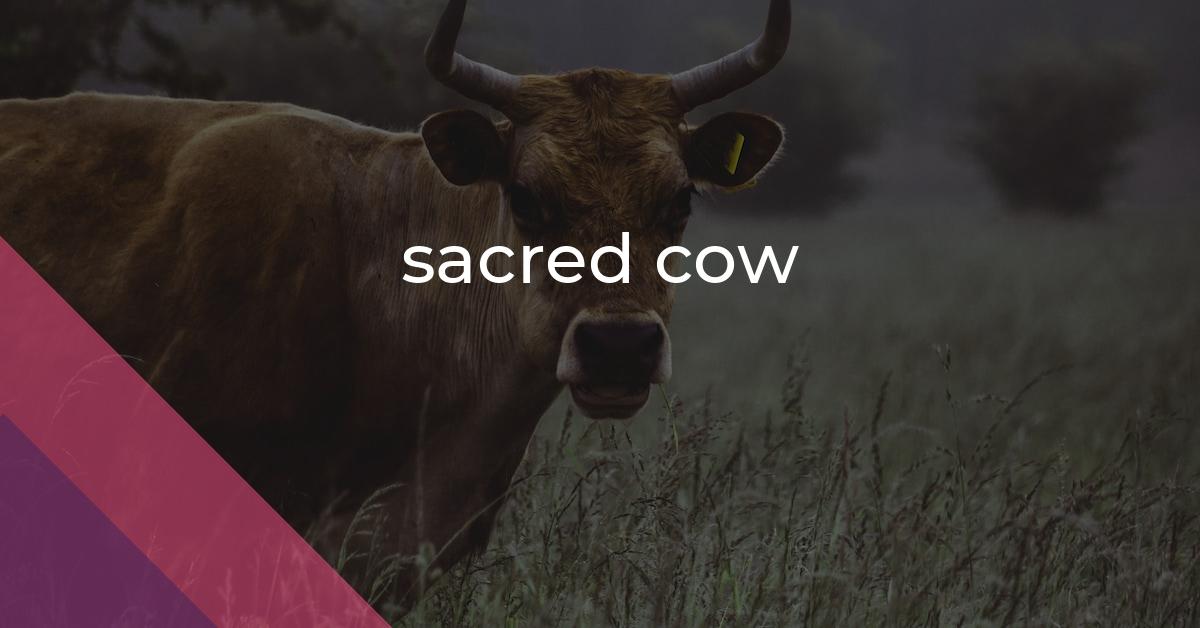sacred cow: Idiom Meaning and Origin
What does ‘sacred cow’ mean?
The idiom *sacred cow* refers to a person or thing that is considered immune from criticism or questioning, often due to its long-standing tradition or importance within a particular group or society.

Idiom Explorer
The idiom "salt of the earth" refers to someone who is genuine, honest, and of great moral character. They are dependable, hardworking, and humble, making them an essential and valued member of society.
The idiom "rubber chicken" refers to a comedic prop used in performances, often associated with jokes that are old or clichéd. It symbolizes something that is overused or lacking originality and effectiveness.
An idiom often used to describe a person who is disliked or considered bad, with negative qualities or behavior.
The idiom "red meat" refers to controversial or provocative topics that generate strong emotional reactions and often fuel arguments or debates.
An idiom used to describe someone or something that is highly unusual or unique; as rare as a rare animal.
The idiom "put on a pedestal" means to admire or worship someone or something to an excessive extent, often idealizing them and treating them as if they are perfect or infallible.
The idiom "preserved in aspic" means something that is outdated or preserved in a way that hinders any changes or progress.
The idiom "pony in the barn" means having something valuable or desirable that is not being used or shown off. It reflects the idea of keeping a pony hidden away in a barn instead of riding it or displaying it for others.
The idiom "pearls before swine" means to offer something valuable or precious to someone who can't appreciate or understand its worth.
Unmasking the Arbiter
The idiom "sacred cow" is widely used in the English language to describe a person, object, idea, or institution that is considered immune from criticism, challenge, or change. Its origins can be traced back to Hinduism and the veneration of cows in Indian culture. In Hinduism, cows are considered sacred and are revered as a symbol of reverence, non-violence, and fertility. Harming a cow is considered a sin, and cows are believed to possess divine qualities. This religious belief has led to the term "sacred cow" being used metaphorically in English to describe something that is considered untouchable, beyond reproach, or unquestionable.
The idiom "holy cow" is a variation of "sacred cow" that is commonly used in American English. It is used to express astonishment, surprise, or disbelief. The phrase "holy cow" is often used in a lighthearted or humorous manner, and it can be used to convey a sense of amazement or awe. For example, if someone receives unexpected good news, they might exclaim, "Holy cow, I can't believe it!"
The idiom "Holy of Holies" is another related phrase that has biblical origins. It refers to the most sacred place within the Temple of Jerusalem, where the Ark of the Covenant was kept. The phrase is used metaphorically to describe something that is considered the most sacred, revered, or important within a particular context. For example, in the field of sports, a dedicated fan might refer to their team's stadium as the "Holy of Holies."
The word "pachyderm" is another idiom that is related to the concept of a sacred cow. It is used to refer to an elephant, which is a large and powerful animal. In a metaphorical sense, the term "pachyderm" can be used to describe something that is big, powerful, or difficult to ignore. For example, in a business context, a major corporation might be referred to as a "pachyderm" due to its size and influence.
The idiom "put on a pedestal" is another phrase that is related to the idea of a sacred cow. It is used to describe the act of placing someone or something in a position of great respect, admiration, or importance. When someone is "put on a pedestal," they are elevated to a high status and are often viewed as beyond reproach. This idiom can be used to describe the tendency to idealize or idolize someone or something.
The use of these related idioms in conjunction with the concept of a sacred cow adds depth and nuance to the understanding of this idiom. It emphasizes the idea that a sacred cow is not only untouchable or unquestionable, but also revered, important, and powerful. These idioms provide additional layers of meaning and context to the metaphorical concept of a sacred cow, enriching its usage within the English language.
The idiom "sacred cow" is widely used in the English language to describe something that is considered immune from criticism or challenge. Its origins can be traced back to Hinduism and the veneration of cows in Indian culture. The related idioms "holy cow," "Holy of Holies," "pachyderm," and "put on a pedestal" further enhance the understanding of this idiom by adding different perspectives and nuances. By incorporating these idioms into the text, we can provide readers with a more comprehensive understanding of the metaphorical concept of a sacred cow and its significance in various cultural, social, and linguistic contexts.
Example usage
Examples of how the idiom "sacred cow" can be used in a sentence:
- 1. The new CEO made it clear that he was willing to challenge any sacred cows within the company.
- 2. The politician's bold proposal threatened to overturn one of the country's long-standing sacred cows.
- 3. Many traditionalists consider the idea of changing the national anthem as a sacred cow that should never be questioned.
More "Religion" idioms



